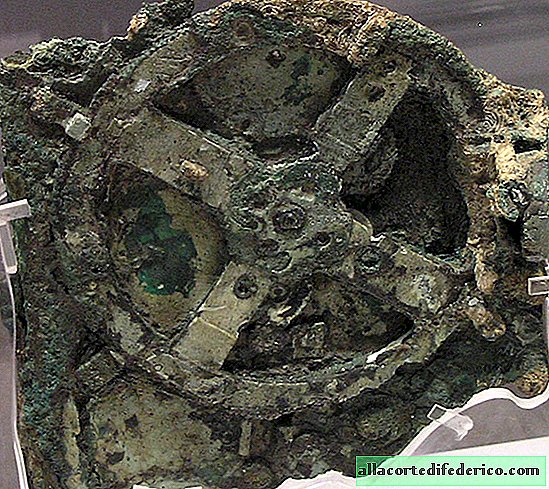What can the ancient Greek "computer"
We live in a century when a small box can replace us with a communication tool, an organizer, a bunch of books, a game console, and anything else (it’s quite possible that you are reading this text from such a device now). Surprisingly, the first computer did not appear in the 20th century, but 2,000 years ago in ancient Greece. True, he had only one function: astronomical. It was used to predict solar eclipses.
Antikythera computer
An ancient device called the Antikythera mechanism (at the place where it was found) was used to identify astronomical events to which the calendar of the ancient Greeks could be tied. The mechanism was discovered by divers behind the sponges, who in 1900 took refuge from a nearby storm on the island of Antikythera. They stumbled upon the traces of an ancient shipwreck. Archaeological research has shown that it happened about 2000 years ago, on the path between Rome and Asia Minor.

When the researchers examined the wreckage, they found a mysterious mechanism measuring about 30 by 30 centimeters with dials, as well as about 30 bronze gears. Although the mysterious object was divided into parts, archaeologists soon found out why it was used: it allowed the ancient Greek astronomers to determine the position of the sun, moon and stars at any time in the future, predicting 42 astronomical events.
Astronomical Google
Despite the fact that the mysterious astronomical calculator, having been lying under water for two thousand years, was pretty rusty, scientists used 3D-visualization to read part of the text on the mechanism, which contains instructions on how to use it. For example, a study showed that there was a zodiac chart on the front of the device, showing that the planets were moving through different constellations.
In 2014, scientists said they decrypted the dial and algorithm that were used to predict eclipses. It turned out that different symbols denoted different types of eclipse. Lunar eclipses, for example, were denoted by the symbol Σ, which was an abbreviation for the moon goddess ΕΛΗΝΗ (Selene), and solar eclipses were denoted by H, which is short for the sun god ΗΛΙΟΣ (Helios).

Scientists note that the Greek "computer" was surprisingly complex. The antikythera mechanism could not only predict the time of the eclipses, but also reveal the characteristics of these eclipses: the degree of shadowing, the angular diameter of the moon and its position during the eclipse.
Although the exact meaning of the eclipse in Greek culture is not entirely clear, it is obvious that this phenomenon was considered an important omen.
















